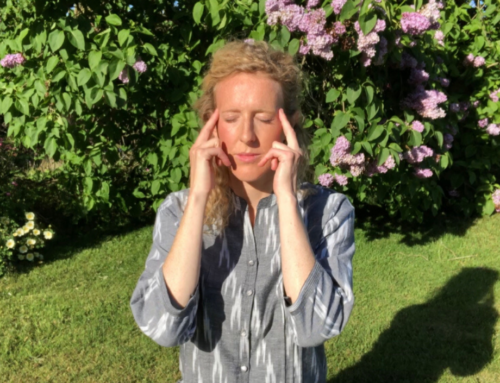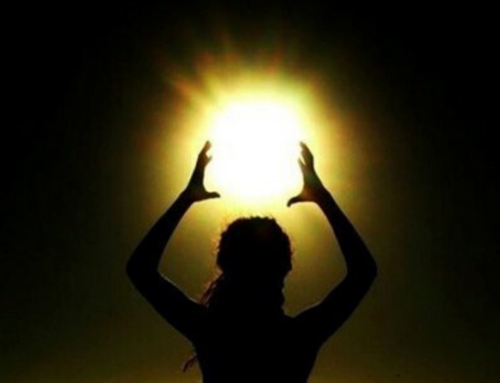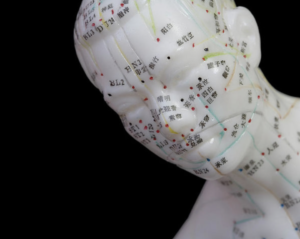
I know I’m not alone in trying to manage anxiety levels at the moment. For me it’s the unknown of what lies beyond the challenges of Covid-19; when will I be able to get my business back up and running? When will I be able to open the doors to the two new clinics I’ve been building during lockdown? Night sweats, broken sleep, disturbed dreams, waking with knots in my tummy, a racing heart and an overall angst are a few of my symptoms. Thank the lord for my tool box of Chinese Medicine tricks to keep the anxiety under wraps when it starts to rear its ugly head.
When I’m not able to find 30 minutes to lie down in my treatment room and needle myself directly, I grab 3 mins here or there and apply acupressure on myself instead. Acupressure a form of traditional Chinese medicine (TCM), which if done correctly can provide instant relief from anxiety. It serves as an alternative (though in my opinion a slightly weaker one) to acupuncture if individuals are fearful of needles or do not have immediate access to it, like now.
Acupressure is the application of pressure on acupuncture points along the body’s meridian (energy) lines. If energy is not flowing freely through these meridians this can lead to imbalance, emotions getting funky (including feelings of anxiety) and eventually illness. Stimulating these points improves qi and blood flow throughout the body creating a state of calm and balance, allowing the body to restore, rebalance and ultimately self-heal. From a western medicine perspective, micro vessels and nerve endings accumulate at acupuncture points – applying pressure to these points is an effective method to trigger the nervous system, bringing about the change your body needs – in this instance stimulating the parasympathetic nervous system to enable the body to rest and digest.
“Anxiety” is a modern term that does not have an exact equivalent in Chinese medicine. There is no term that corresponds exactly to what we call “anxiety” but several ancient Chinese disease entities closely resemble it. The four main disease entities that correspond to it are:
“Fear and Palpitations” (Jing Ji)
“Panic Throbbing” (Zheng Chong)
“Mental restlessness” (Fan Zao)
“Agitation” (Zang Zao)
However, different emotions correspond to different organs in TCM: joy is associated with the heart and small intestine, sympathy with stomach and spleen, grief with the lungs and large intestine, fear with the kidneys and bladder, anger with the liver and gall bladder. Anxiety however can have one of several origins according to TCM:
If related to the lungs and large intestine (metal), qi blockage can provoke shallow and irregular breathing or even holding of breath. The large intestine can be detrimentally affected by anxiety, making one more prone to issues like IBD (Crohns and Colitis) and IBS.
Kidney and bladder (water) issues could also be at the root of this emotion. As fear is the emotion that pertains to the kidneys and as anxiety is more often than not associated with fear, the kidneys play a large role. If you also suffer any of the following: incontinence, night sweats, dry mouth, infertility, low back pain, tinnitus, hearing loss, premature greying, hair loss and osteoporosis, then your kidneys need some TLC
Anxiety can also be caused by disharmony between the kidneys and heart (fire), if the cooling water (yin energy) of the kidneys is not available to cool the heart fire flaring upwards nor keep it burning safely and consistently, then rapid heart palpitations, insomnia, disturbed dreams, bitter taste and a feeling of heat may be experienced. Vice versa if the fire of the heart cannot warm the water, kidney qi it is unable to rise and nourish the brain and settle the mind.
Anxiety can stem from liver (wood) imbalance too, when longstanding anger and irritation goes unresolved. In this case anxiety manifests as nervous tension, irritability, and insomnia.
Anxiety from excess worry and pensiveness stems from spleen and stomach (earth) imbalance. This can cause stomach swelling and bloating after eating and knots in the stomach.
And so, here’s my 3 minute DIY acupressure routine to address all these organs, for instant anxiety relief:
Kid 27 – Shufu – Storehouse Shu
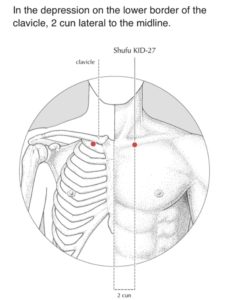
(2 cun = 2 of your thumb widths). The final point on the kidney meridian where Qi can easily accumulate. Excellent point for releasing mental anxiety and physical strain when, through overworking there is fatigue. This point builds qi and helps a person build their own reserves after burnout.
He7 – Shenmen – The Spirit Gate
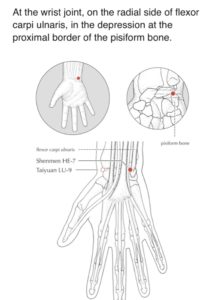
When you have chronic ill health or your body, mind or spirit is crumbling this point can strengthen and calm the spirit (Shen) at all levels. A wonderful point for any anxiety especially if you have it along with any sadness, worry, mania, vulnerability and when there is lack of joy in your life eg. from a broken heart.
LI4 – He Gu – Joining Valley
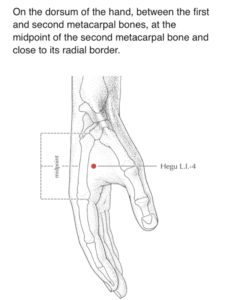
One of the classic points of acupuncture for calming and grounding the body, mind and spirit. It is a powerful relaxant, allowing the body to let go of both emotional and physical matter that does not serve you. Used with Liv3 below, known as the Four Gates, is ideal for treating anxiety especially if extreme muscular tension and pain are involved also. (Do not use during pregnancy due to its relaxant effect).
Liv3 – Tai Chong – Great Rushing
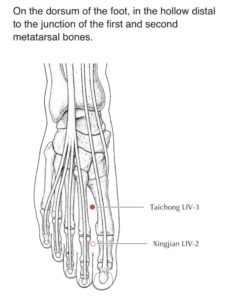
Or take its alternative name of ‘Happy Calm.’ Needn’t really explain more other than it’s excellent for those who are also quick tempered, easily frustrated and angry. Used with LI4 above it’s a miracle point for generalised anxiety disorder.
Sp3 – Tai Bai – Supreme White
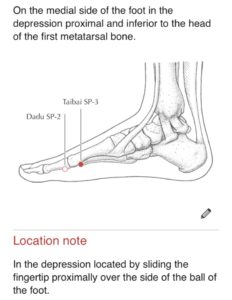
Used for anxiety along with excessive thinking and worry, this point is a good one to calm the spirit, reduce worry, promote memory and clear foggy thinking. Physically it reinforces the transforming and transporting function of the spleen, so if anyone suffers with bloating or any digestive symptoms with anxiety, then this point is for you.
Kid1 – Yong Quan – Bubbling Spring
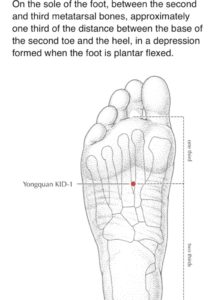
Has a strong effect on the mood of a person with severe anxiety, drawing qi and negative thoughts down away from the head to the earth, inducing an incredible calm and stabilising influence. As it tonifies yin, it is used when there is a division between the kidneys and heart, splintering the spirit. Highly recommend for anyone with anxiety associated with insomnia, infertility, back pain or dizziness.
Method:
- Begin with acupressure point Kid27, working through all the above points finishing with Kid1.
- Spend 30 seconds on each point, on each side of the body.
- Apply firm pressure in a circular motion while breathing steadily. If you are pressing on the correct point, you should feel some tenderness.
- Repeat once in the morning before breakfast and again before bed.
Voila my zen friends. DM me with any questions or if you need further guidance: laura@lauraboscawen.com
Acupuncture point diagrams courtesy of ‘A Manual of Acupuncture’ by Peter Deadman
